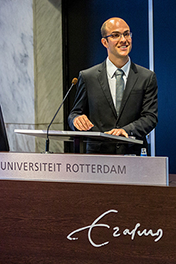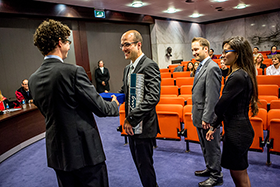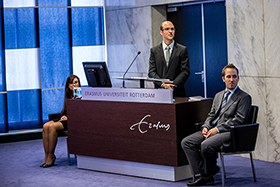PhD Defence: The Functions and Dysfunctions of Reminders
 Consumers often use reminders to remember the bills to be paid on time, subscription to be renewed, and early bird specials. Companies often send reminders to consumers in their marketing. New research by PhD graduate Daniel Fernandes of Rotterdam School of Management, Erasmus University (RSM) shows that the use of reminders may accelerate the purchase of a product among certain consumers and delay it among other consumers. Tailoring memory cues to the target audience is key in a successful marketing strategy.
Consumers often use reminders to remember the bills to be paid on time, subscription to be renewed, and early bird specials. Companies often send reminders to consumers in their marketing. New research by PhD graduate Daniel Fernandes of Rotterdam School of Management, Erasmus University (RSM) shows that the use of reminders may accelerate the purchase of a product among certain consumers and delay it among other consumers. Tailoring memory cues to the target audience is key in a successful marketing strategy.
Memory cues surround us on a daily basis, whether it’s the reminder of a store discount valid until tomorrow, or a post-it stuck to the fridge to keep us from forgetting to walk the dog. In his PhD dissertation ‘<link doctoral-programme phd-in-management phd-projects detail>The functions and dysfunctions of memory cues’, Fernandes examines the mistakes people make when using reminders. First of all, he finds that a few consumers use shopping lists (only one in two consumers uses them to remind them of a task). Fernandes argues that, because of overconfidence of their memory, consumers often incorrectly predict that they will remember to do something and neglect the use of shopping lists.
Another issue documented by Fernandes is that the effect of a reminder on the completion of a task is not identical for everyone. Reminders help people with a high ability to plan, which is in most cases related to a higher income, a higher education level and good credit score. On the contrary, people with low education and income levels and people with poor credit scores should not use reminders, since they actually hurt their ability to complete their tasks. This is because for people with a low ability to plan, reminders cause tasks to be procrastinated. Among those individuals, a more effective intervention to get something done might be to ask them to perform the task immediately or at least as soon as possible. Thus, procrastination is discouraged and, hence, tasks are more likely to be completed.
Companies, who often use memory cues in their marketing, need to understand these positive and negative effects in order to tailor appropriate interventions suited for different groups of individuals. If done successfully, the correct use of reminders may actually boost sales.
Fernandes defended his dissertation Friday, 25 October 2013. His promoter was Stijn van Osselaer, Professor of Marketing, and Co-promoter was <link people stefano-puntoni>Stefano Puntoni, Associate Professor of Marketing Management. Other members of the Doctoral Committee were Berend Wierenga (Professor Emeritus of Marketing at RSM), Benedict Dellaert (Professor of Marketing at Erasmus School of Economics), John G. Lynch (Professor of Marketing at Colorado University), Elizabeth Cowley (Professor of Marketing at University of Sydney), and Fernando Machado (Professor of Marketing at Catholic University of Portugal).
About Daniel Fernandes
 Daniel Fernandes (Brazil, 1983) obtained his master’s degree in 2008 in Business Administration at UFRGS in Brazil. In the same year, he started his PhD research in Marketing at Erasmus University. Daniel’s research interest centers on transformative consumer research and includes consumers’ memory, planning, financial literacy, decision-making and self-regulation. In the financial domain, he investigates the role of financial knowledge on financial decision-making and the factors that explain this relationship. Outside of the financial domain, Daniel studies consumers’ memory and when reminders help consumers to complete their tasks. Chapter 2 of his dissertation is under review at the Journal of Consumer Psychology and Chapter 3 is under review at the Journal of Consumer Research. He was a visiting research scholar at the Colorado University in 2010. From September 2013, he serves as an Assistant Professor in Marketing at Católica-Lisbon School of Business and Economics.
Daniel Fernandes (Brazil, 1983) obtained his master’s degree in 2008 in Business Administration at UFRGS in Brazil. In the same year, he started his PhD research in Marketing at Erasmus University. Daniel’s research interest centers on transformative consumer research and includes consumers’ memory, planning, financial literacy, decision-making and self-regulation. In the financial domain, he investigates the role of financial knowledge on financial decision-making and the factors that explain this relationship. Outside of the financial domain, Daniel studies consumers’ memory and when reminders help consumers to complete their tasks. Chapter 2 of his dissertation is under review at the Journal of Consumer Psychology and Chapter 3 is under review at the Journal of Consumer Research. He was a visiting research scholar at the Colorado University in 2010. From September 2013, he serves as an Assistant Professor in Marketing at Católica-Lisbon School of Business and Economics.
Abstract of The Functions and Dysfunctions of Reminders
In the first essay of his dissertation, Fernandes found that people do not use memory cues because they are overconfident about their memory. That is, consumers often incorrectly predict that they will remember to do something, do not take appropriate actions to help them remember and end up forgetting to do what they should be doing.
 The second essay of his dissertation shows that, when multiple tasks are involved, reminders sometimes benefit, but sometimes harm task completion. Reminders help people high in propensity to plan to resume an interrupted task in the future and to maintain vigilance for opportunities to complete it. But they harm the execution of other tasks that demand immediate attention. On the contrary, reminders hurt those low on propensity to plan to resume an interrupted task and they decrease the urgency to start working on the task. But they also free up cognitive resources to be used for other tasks that require immediate attention.
The second essay of his dissertation shows that, when multiple tasks are involved, reminders sometimes benefit, but sometimes harm task completion. Reminders help people high in propensity to plan to resume an interrupted task in the future and to maintain vigilance for opportunities to complete it. But they harm the execution of other tasks that demand immediate attention. On the contrary, reminders hurt those low on propensity to plan to resume an interrupted task and they decrease the urgency to start working on the task. But they also free up cognitive resources to be used for other tasks that require immediate attention.
Reminders sent out by companies may accelerate the purchase of the product among consumers high on propensity to plan. But, it may delay the purchase of the product among consumers low on propensity to plan. It is important to understand for whom the reminder helps and for whom it hurts task completion and performance such that companies and policy makers can tailor appropriate interventions for different groups of individuals. For example, propensity to plan is related to income, education and strongly related to the FICO credit scores. Perhaps for those at the bottom of the income distribution, for those with low education levels and for those with low FICO credit scores, reminders should not be used. Among those individuals, a more effective intervention to get something done might be to ask them to either perform the task immediately or as soon as possible. In that case, procrastination is discouraged and, hence, tasks are more likely to be completed.
- <link doctoral-programme phd-in-management phd-projects detail>Download Daniel's dissertation
- View photos of his defence
Photos: Chris Gorzeman / Capital Images


